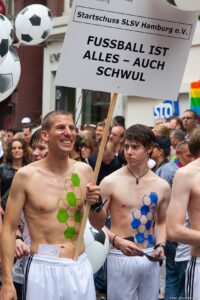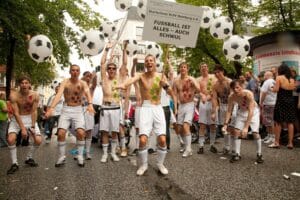
Carsten Stock loves playing football. He started out as a child on a football pitch in Rinteln and even co-founded a club as a student in Hanover: Stock played in the amateur league with FC Union Hannover for several years and was a youth coach at another club. Even as a professional, Carsten Stock has remained true to his favourite sport: since 2002, he has been a member of the gay and lesbian Startschuss Hamburg sports clubIn 2004, he took over the management of the football department - all on a voluntary basis. His job leaves him very little free time: the 43-year-old is the commercial manager of a large car dealership group in Hamburg. In 2012, the German Football Association (DFB) honoured this commitment with the DFB Honorary Award. Carsten Stock tells iwwit.de why he is committed to his club - and how sport helped him come out.
Carsten, you've played football with both straight and gay players. Is there a difference when your team consists almost exclusively of gays?
Yes, of course. You're more open with each other. Everyone knows that the other person is gay. That's completely natural. Another big difference is, of course, that our Startschuss team is a recreational team. That means we take part in tournaments, but we don't have to be on the pitch every weekend. But there's also a special atmosphere at the competitions: it's more relaxed, like in a big family. You're happy to see people again and a lot of friendships are formed at gay tournaments. You don't have all of that in the same way at normal matches.
How did you find out about your current team at Startschuss?
Via the Internet. I wrote to Startschuss in 2001 - and then received no reply for three months. I must have been thinking about visiting Startschuss since 2000. But I found it very difficult back then, I was in the middle of coming out. There was something about cheerleaders on the Startschuss website. If you've only ever played football in the straight world and you're in the middle of your coming out phase, then it's damn hard to imagine male cheerleaders. The idea alone was enough to put me off at the time.
There's a great promotional photo of the kick-off footballers: The defence wall jumps - and everyone carries a ladies' handbag. Weren't you afraid that this dodgy picture might put off interested parties who were still coming out? Like you did back then?
That's something else. (laughs) We don't wear skirts, just handbags. There is a famous example: a photomontage of the Argentinian national football team forming a wall. Someone had mounted handbags in the players' hands. We recreated this in real life. All our promotional postcards that we designed for the Hamburg CSD are in a similar vein: we don't take ourselves too seriously. It's great fun to see how people react to such a motif. You walk through the CSD, press the postcard into people's hands and put a smile on their faces. That's brilliant! That's exactly what we want to achieve: We're playing with the cliché that all people are foppish - and people have to laugh. They have a positive connection and deal with the whole issue. You reach a lot of straight people at CSD. And they take the opportunity to realise that gay people are very different from what they always thought.
Is it part of your voluntary work to break clichés?
There are two goals: On the one hand, we want to reach straight people and refute stereotypes. On the other hand, we want to promote Startschuss. For some time, the footballers were the only Startschuss section to run in the Hamburg CSD. Simply because we were short of young talent. When we analysed the situation, we asked ourselves: Do gay footballers even know that there is a gay and lesbian sports club in Hamburg? And we had to realise: Most of them know nothing about it. Startschuss is the largest gay and lesbian club in the city, but it was barely present in the public eye. Fortunately, that has changed in recent years - also thanks to our CSD campaigns.
How much time does the association's work cost you?
That varies greatly. Sometimes there is a lot to do. For example, when there's an international tournament like the IGLFA EURO 2013 in Dublin in June. I was responsible for the financial organisation and other things. We also had to organise meetings to motivate people to come along. You put a lot of time into that: You have to make sure that everyone pays. You have to order jerseys and get them to Dublin. You have to distribute the beds, and, and, and ... There's a lot to do. In the early years, I had to do a lot on my own, but now I have two deputies and two coaches. The tasks are now spread over several shoulders. That's manageable.
Why do you sacrifice so much of your free time for the club? You also have a full-time job on the side.
I think you're born with it. I grew up in a family of entrepreneurs. And that means you learn responsibility. The other thing is: when I do something, I want to help shape it. And you can only do that if you take responsibility. I'm not a follower.

When you look back: Was it a good decision to join a gay sports club?
Yes, there were two important catalysts in my coming out: on the one hand, it was the football at Startschuss and on the other, sailing. I met a group of eight people via the Eurogay portal and we went sailing together: In the evening, you sit together on deck with a beer and chat in peace, similar to football tournaments. You learn a lot about other people's lives and paths. That was very important for me. Someone on the ship once told me that he had missed telling his parents that he was gay. They were now too old for him to tell them. For me, this conversation was the reason to come out to my parents. Not because I had the feeling that they would be happier - but because it meant we could be more open with each other. Until then, I had hidden a significant part of my life from my parents.
In the meantime, you have even been honoured with the DFB Volunteer Award for your commitment. Reservations are dwindling, even in football. Will your club soon become redundant because gay footballers can play in straight teams with full acceptance?
No, I don't think so. A gay club offers a special atmosphere. You have a space of freedom that you don't have elsewhere. For me, it was exactly the right place to come out and to find a way to live as a gay man. The club has lost none of this significance. That's why I'm convinced that Startschuss will be around for many years to come.
A fairly up-to-date list of gay and lesbian sports clubs throughout Germany can be found on the Website of the Berlin association Vorspiel Berlin.









